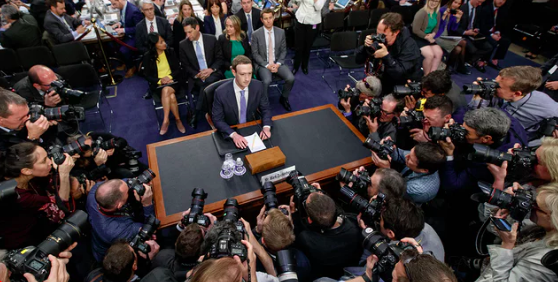The media has been awash with news about Cambridge Analytica, Facebook, and the data breach the social media titans (basically) let happen. Mark Zuckerberg, the 33-year-old founder of Facebook has also been under fire for this and the no-nonsense (in comparison to ours) congress called him for a hearing yesterday. For 5-hours, the members of the Senate commerce and judiciary committees grilled the billionaire on privacy, data mining, regulations and Cambridge Analytica. See the highlights.
-
Zuckerberg wore a suit
Ah well, everyone knows the 5th richest man in the world loves his signature grey T-Shirt, but for this all-important hearing, he ditched it for a black suit, and sky blue tie. He sat contrite and silent as senator after senator expressed deep concerns about the company’s gathering of personal information. And when it was time, he humbly answered question after question.
-
Right to privacy
“I believe it’s important to tell people exactly how the information that they share on Facebook is going to be used. That’s why, every single time you go to share something on Facebook, whether it’s a photo, or a message, every single time, there’s a control right there about who you’re going to be sharing it with … and you can change that and control that in line.
“To your broader point about the privacy policy … long privacy policies are very confusing. And if you make it long and spell out all the detail, then you’re probably going to reduce the per cent of people who read it and make it accessible to them.”
-
Cambridge Analytica
First Zuckerberg said Cambridge Analytica wasn’t using Facebook’s services in 2015. He said they were not an advertiser, so Facebook had nothing to ban. But he later corrected himself and said: “I want to correct one thing that I said earlier in response to a question … [on] why we didn’t ban Cambridge Analytica at the time when we learned about them in 2015. “[From] what my understanding was … they were not on the platform, [they] were not an app developer or advertiser. When I went back and met with my team afterwards, they let me know that Cambridge Analytica actually did start as an advertiser later in 2015. So we could have in theory banned them then. We made a mistake by not doing so. But I just wanted to make sure that I updated that because I … I … I misspoke, or got that wrong earlier.”
Continuing, he said, “when we heard back from Cambridge Analytica that they had told us that they weren’t using the data and deleted it, we considered it a closed case. In retrospect, that was clearly a mistake. We shouldn’t have taken their word for it. We’ve updated our policy to make sure we don’t make that mistake again.”
-
Personal Data
When asked about storing and selling data, Zuckerberg responded: “Yes, we store data … some of that content with people’s permission. There’s a very common misconception that we sell data to advertisers. We do not sell data to advertisers. What we allow is for advertisers to tell us who they want to reach, and then we do the placement. That’s a very fundamental part of how our model works and something that is often misunderstood.”
Senator Tammy Baldwin asked whether the Cambridge University neuroscientist Aleksandr Kogan sold the Facebook data to anyone besides Cambridge Analytica?
“Yes, he did,” Zuckerberg responded. “We’re investigating every single app that had access to a large amount of information in the past. And if we find that someone improperly used data, we’re going to ban them from Facebook and tell everyone affected.”
-
Regulations
When asked about his position on regulation, he said; “my position is not that there should be no regulation. I think the real question, as the internet becomes more important in people’s lives, is what is the right regulation, not whether there should be or not.”
-
Russian interference
“One of my greatest regrets in running the company is that we were slow in identifying the Russian information operations in 2016. We have kicked off an investigation … I imagine we’ll find some things. There are people in Russia whose job it is to try to exploit our systems and other Internet systems and other systems as well. This is an ongoing arms race. As long as there are people sitting in Russia whose job is it to try to interfere in elections around the world, this is going to be an ongoing conflict.”
-
Taking responsibility
For most of the hearing, Zuckerberg seemed contrite and interjected a lot of his responses with apologies. “It was my mistake, and I’m sorry. I started Facebook, I run it, and I’m responsible for what happens here. It’s clear now that we didn’t do enough to prevent these tools from being used for harm. That goes for fake news, foreign interference in elections, and hate speech, as well as developers and data privacy.”
-
The neutrality of Facebook
Senator John Cornyn pushed him on whether Facebook is a neutral platform. Zuckerberg replied, “I agree that we are responsible for the content” – a significant concession that could open the way for Facebook to be held to the same legal standards as a traditional media company.
-
Some Senators tried to throw him off balance
John Kennedy of Louisiana said bluntly: “Your user agreement sucks.”
Democrat Dick Durbin asked: “Would you be comfortable sharing with us the name of the hotel you stayed in last night?” There was a long pause before Zuckerberg replied: “No.” There was laughter in the room.
Democratic Senator Richard Blumenthal challenged Facebook’s contention that Aleksandr Kogan, a Moldovan-born researcher from Cambridge University, deceived the company when he harvested user data. Blumenthal had what he claimed was a previously undisclosed 2014 terms of service document that explicitly permitted Kogan to “sell, licence (by whatever means and on whatever terms) and archive your contribution and data”.
Blumenthal said: “We’ve seen the apology tours before. You have refused to acknowledge even an ethical violation to report this violation of the FTC consent decree. My reservation about your testimony today is that I don’t see how you can change your business model unless there are specific rules of the road. Your business model is to maximise profit over privacy.”
-
Aftermath
Despite the intense grilling, Zuckerberg held his own and represented himself and Facebook very well. Whether you agree or not, the stock market supports this, as Facebook’s price, which had fallen badly in recent weeks, ended the day up 4.5%. Nevertheless, Zuckerberg will face a second grilling from the US House energy and commerce committee.



